If there is a band that doesn’t need introduction, that’s The Mission, one of the most famous Goth rock groups. They have composed classic songs such as “Deliverance,””Severina” or “Wasteland,” and they are definitely one of the reasons why a lot of us started dressing completely in black. We have talked with a very kind Wayne Hussey who answered this long interview that it’s going to be published in two parts. They are headlining Sinner’s Day Saturday, the fantastic festival that will take place between the 30th of October and the 1st of November in the Belgian city of Heusden-Zolder. Goth Own Medicine.
—You have been living in Sao Paolo for a long time, right? How is living in Brazil for a “Goth Star”?
—I like Brazil, it’s like my home. I’ve been here for 15 or 16 years now. Although we have an apartment in the city, we also have a place in the countryside which is where we are at the moment. It’s quiet and it’s secluded. We have a studio here, so we were working there. Obviously with the situation of the pandemic, we spend a lot of time at home which is something we don’t normally do, either myself or my wife. We are usually busy doing other things. But it’s been good, you know, we got dogs, we got family here, so it’s actually been quite decent. I do miss traveling, I have to say, I do like visiting cities and other places. But you know, compared to what some people like to endure, it’s been nothing, really. It’s not much of a sacrifice.
—Don’t you miss your country?
—I miss my family and friends, I also miss shopping. I usually come back with suitcases full of things, but you know, other than that, I don’t really miss the weather, I don’t really miss the culture of Britain. You know, with Internet and with the access to news channels and everything, it’s pretty easy to keep up to date with what’s going on and keep in touch with people so that’s a blessing.
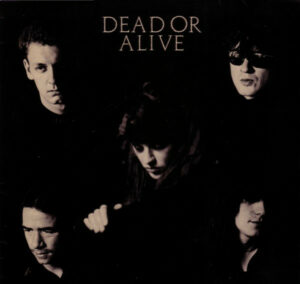 —Although you have published your autobiography two years ago, we would like to ask you a few things about your past. Let’s start with the time that you spent with Dead or Alive. Did you just record the EP It’s Been Hours Now with them or did you work in more of their EPs/singles?
—Although you have published your autobiography two years ago, we would like to ask you a few things about your past. Let’s start with the time that you spent with Dead or Alive. Did you just record the EP It’s Been Hours Now with them or did you work in more of their EPs/singles?
—I think we recorded one EP, then recorded a couple of singles. We were recording the first album when I left. It became obvious that there wasn’t much room in the direction they were taking for a guitar so… you know. I was a guitar player, a young kid with lots of ego, I wanted to play on records. I left, because I did not appreciate the fact I was being replaced by machines.
—How was working with Dead or Alive? Did they look like a professional band back them or just a bunch of guys who wanted to do some music?
—It was good, you know, I really enjoyed the first year or so (18 months) being in the band. It was really good, we were essentially a rock band and what you could probably call goth (goth was not even invented then). It was tribal drums, guitars, and bass, keyboards… It sounded like The Doors… And Pete had a very big voice. It was good, we were a gang, although we didn’t play many shows. I think we only played 6 shows in the two years I was in the band. When you compare that to the shows I did with The Sisters of Mercy, and I was only with them for 2 years, it’s quite incredible. We were not prepared to get in the back of the van and go in and play in every little shithole. Dead or Alive played six shows, each was quite prestigious. We played at a festival, we supported Killing Joke. We played in selected venues in Liverpool. It’s a different way of doing things, but it kinda worked for us. We tended to spend our time more in the rehearsal room, writing new songs and trying to be a good band.
—After that, you composed some classic tracks with the Sisters of Mercy for their first album. What happened to the songs that were going to appear in the second album?
—Well, over the course of the two years I was in the band, we must have played up to 300 shows. Compare that to the six that I played with Dead or Alive. We released 3 or 4 singles during that period and an album, First and Last and Always. Gary Marx left the group and we carried on as a three-piece, Craig, myself and Andrew. We were planning to make a second record, so I was writing tunes for that album with the idea that Andrew would add lyrics and vocals. But when we sat down and I played the stuff to Andrew, he didn’t like any of it. He wanted to go his own way, which is fair enough. I mean, we are creative people and you have to follow your instincts. Eventually, it became obvious that he had very different ideas to Craig and I, so we decided to leave and form our own band and obviously I had already a whole load of tunes, songs ready to go. I just needed to write some words for them and then learn how to sing. It worked out all right for everybody in the end.
—Why did you want to continue your career with the name of the Sisterhood? Did you want to create a link because of the work you have already done with your previous band?
— When we left The Sisters, we were still kind of thinking of ourselves as The Sisters. We gave some tapes out to people and we just call ourselves The Sisters, not because we were The Sisters of Mercy, just because people knew we didn’t have a name, so it was easier to put on a cassette The Sisters rather than Wayne Hussey and Craig Adams. We kind of used that initially just for convenience sake, and then just ended up extending it to the Sisterhood when we got offered The Cult tour. We needed to come up with a name really quickly and thereby at that point we hadn’t really thought a name for the band, so we just used that without thinking that we could incur thew wrath of God. There was also The Brotherhood, an idea of a name that we had for a band. It was Craig and Billy Corgan, it never actually got off the ground, but that’s another story.
—How has religion influenced your work? From your upbringing to the name of the band and also a lot of lyrics, there are always connections to your Mormon education.
—I was raised as a mormon, so I was very familiar with the language of The Bible. I think that kind of biblical stories kind of fit with the way that I use words and write songs. I’m not particularly religious anymore, I haven’t been for a long time, although there have been times in my life where I felt spiritual but that something else completely different. I just think it’s a language I grew up with, that I was comfortable with and that I used it with a poetic license. To me, it’s words that sounded good. There are some songs that mean some things to me and other things to other people, but mostly in my writing of songs over the years I have been more concerned about the sound of the words rather than their meaning if that makes sense.
—And what were your influences back in the day? What were you listening to?
—I was listening to whatever was cool and trendy. I was listening to Bunnymen, Siouxsie and the Banshees, The Cure, Public Image, Soft Cell. All these bands were having hit singles so it wasn’t like it was completely underground. I was also going back and listening to Iggy and the Stooges, The Velvet Underground, The Doors, you know, stuff like that. Joy Division too, of course. Anything that was good and a little bit different really. At that time, music wasn’t defined by genre in the same way it is now. It was basically pop music or alternative music. Or heavy metal, of course.
—What do you remember the recording of God’s Own Medicine, for a lot of people, one of the best albums of the eighties?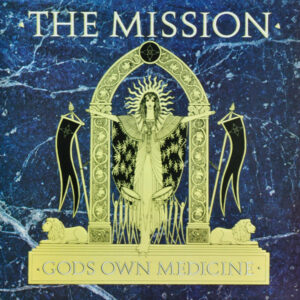
—It did not take very long to record it because we had been playing the songs live and as we talked about before most of those songs had already been written for the second Sisters record. There is only one or two tunes on that record that maybe weren’t around when we were still working with Andrew. So it wasn’t a case of trying out in the studio. We went there, we knew the songs, we banged them down. I think the whole album was finished in three weeks. Three weeks! In these days, with recording budget as they are, it’s not that rare to make a record in that time, but in the mid-80s when recording budgets got huge… For instance, Children, our second album took three or four months in studio to make, and that’s a lot of money. Where in the first album we just went in and basically played the tracks live and then we did some overdubs and overdubbed the vocals and mixed it. I think the whole thing was recorded, mixed and mastered within five weeks, whereas the second album was probably in six months. When you consider that it’s probably somewhere in the region of £500-£800 a day in the studio, six months is a lot money. We don’t have those budgets any more. Not many people do anyway. Fortunately, I have a studio home here so my recording costs the minimal these days, which is great.
—How do you remember the Goth scene back in the 80s? Did you have the feeling of starting a genre?
—No, I mean not particularly. We were all part of a group of people that gravitated towards the same kind of cultural icons, the same kind of music, the same kind of literature, poetry, films, arts. In the early 80s, I think Goth movement was born out of the new romantic movement. You went to clubs and they played that music that wasn’t in the top 40. It was the kind of more alternative music and that’s how it was seen. It was really only in 1982 or 83, when the Batcave came along in London and took that new romantic thing and made it darker, more pantomime and more Hammer House of Horror. That was when the scene became what we know now is Goth, but none of us at the time, thought we were creating a scene. You cannot go out to create a scene, it happens naturally. And I think most youth movements happen naturally and they happen as a reaction to what has been gone before. It was a journalist probably who came along and named the scene Goth, but at the time, it was called positive punk, it was called new wave. You know, it was called all kinds of things, but the people that were more influenced by the darker side of things, ended up being called Goth. It’s like when you’re in the eye of the hurricane you don’t really feel what’s going on around you.
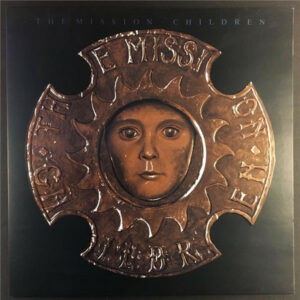 —How was working with John Paul Jones in your second album Children?
—How was working with John Paul Jones in your second album Children?
—It was great. I look back at it now and it felt like a wise uncle to us. It felt like it was a lot older than us, but in reality he was only 12 or 15 years older than us. I think he was like 42 or 43 at the time and I thought -“Guy’s really old”. But he was wise; obviously, he had gone through everything that we were going through. Even more because he was with Led Zeppelin. He was a lovely man, he is a lovely man and very easy to be around. I think he wanted to get into doing production, I think he did bits and pieces as well as us. He knew how to make records. Before he was in Led Zeppelin, he was very sought after, he was a very popular session musician and he played on a lots and lots of people’s records in the 60s, hit singles and everything. So he knew how to work in the studio and he knew how to make us comfortable. He knew how to do it, which was great for us at that point in time.
—Why did you choose him? I mean the band was also always being compared with Led Zeppelin.
—I know from the very beginning, and even from The Sisters days that I was very vocal about my affection for Led Zeppelin and I remember a few things appearing in the press. We listened to Led Zeppelin in our van on tour when Led Zeppelin were social outcast. They were seen as being very, very untrendy, but in the end it’s just music and it’s music we liked. And then, we had the opportunity of working with John Paul Jones and it was like -“Yeah sure!” We have done the first album with Tim Palmer, who worked previously with Dead or Alive and I guess the natural course of events really was to make that second record with Tim, but we had the opportunity of working with one of our heroes and it was like -“okay, we will take this opportunity”. I mean, in hindsight, when I listen to Children now I think that record could have been a lot better. And if we had not used as much reverb on the voice and I think we could have made a better record, but it’s the record we wanted to make at that point in time. We had fun making it and we took our time making it. And another thing that John Paul Jones is very good at, it’s keeping the record label at a distance from us and ended up banning them from the studio, which is great.
—Was Masque going to be an album on your own? I have read different things about that. 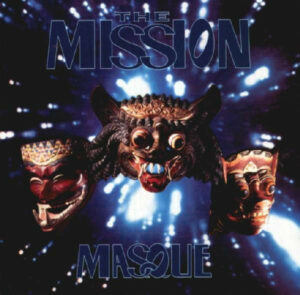
—No, I don’t think I ever intended it as an album of my own. I was in a rented cottage on the border of England and Wales on my own, writing the songs and I think at that point, I just wanted to break away from being in the band format. We had previously released works like Carven in Sand or Grains of Sand. We made five albums with the traditional four-piece rock band and I just wanted to try to do something else. I didn’t really think of it as a solo album. It felt like an album I was making with Craig and Mick, although in hindsight, in retrospect, I think maybe they just went along with it to indulge me. We lost sight at that point, I just think it was a record I felt that I needed to make, something different from what we had done before. It could easily have come out as a Wayne Hussey record, I suppose. If that had been maybe it would have been accepted a lot differently. At the time, I know that a large proportion of our audience didn’t like that record on release, but you know what, the best artists are always bands that surprise you and you know it’s very rare that you’d like everything a band releases, very, very rare. So in the end, you got to please yourself. I look back at that record, and I think that’s a record that I needed to make whether it was with the band or not.
—You said that, back in the day, you were into dance music. Can you please tell us what did you like?
—Yes, I was. Ecstasy was a drug of choice at that time so obviously when you’re in that state of mind, you can start listening to that kind of music. Primal Scream’s Screamadelica was a favourite of mine. It had an effect on my mindset, but if you listen to the album is hardly a dance record. Maybe “Never again” but if you listen, it’s all guitars, it’s not sequencers, it’s all guitars put through different effects that make them sound a bit dancing, but it’s not a dance record, by any means. Listen to “Like a child again.” That’s not a dance song
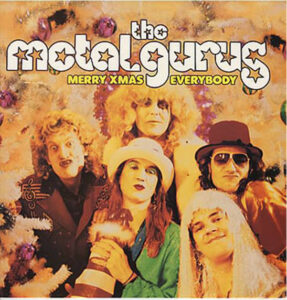 —What can you please tell us of The Metal Gurus? How was the idea for this side-band born? Was it only a kind of tribute to Marc Bolan?
—What can you please tell us of The Metal Gurus? How was the idea for this side-band born? Was it only a kind of tribute to Marc Bolan?
—Yeah, that was a little earlier, like two years earlier. We all got into music in the early 70s, when glam rock was the popular pop music. T-Rex, Slade, Sweet, even Bowie, stuff like that. We always messed around with those songs in sound checks and on rehearsals, just for fun. And we were asked to support The Wonder Stuff on some special shows they were doing. At that point we were quite big, too big really to go and support that band but we did it. We thought -“let’s dress up in glam rock clothes and call ourselves The Metal Gurus and just play glam rock songs just for fun”. And so that’s what we did. I think we played two shows and then we ended up making a single and stuff. It was just fun for us to do.
—What else can you please tell us about this single?
—We recorded “Merry Xmas Everybody.” We did three Slade songs and “Metal Guru.” We actually did it with Noddy Holder and Jimmy Lea from Slade. They produced the single which was another great thrill for us as I was in the Slade fan club when I was a kid. I think this is a thing that people have never really understood about The Mission. The Mission has always been fun. There’s always been that element and if you want, let’s talk about the laws of Goths. There are certain laws of the Goth and one it’s that you can’t have too much fun. I think there are some people and certainly in the music press that just didn’t understand the fact that we wanted to have fun. Music is supposed to be taken seriously, yes, of course, it is, but at the same time you can have fun with it. I was very disappointed when “Merry Xmas Everybody” wasn’t a big hit for us. Haha, I think The Metal Gurus had a bright future if that had been a hit but sadly, we released one single and it flopped, so we disbanded. I think that the next incarnation, if we ever do it again, it will be Punk Floyd.
—According to you what was wrong with Blue? You said that you hated that album, right?
—We were dropped by Phonogram and Simon and Craig both left the group. It was just left Mick and me and we decided to carry on and get new members in. It was just a transitionary time and we didn’t have very much money to record that album. We were used to big budgets previously and that record was made for next to nothing. That for me was a big factor in its sounding. I ended up producing it because we couldn’t afford a producer and we recorded it in a little cheap studio. And it sounds like it to me. Although it’s a raw album. And plus I was going through a marriage breakup, even though I didn’t really recognise that at the time. In retrospect, if you listen to the songs you can hear that going on. The marriage lasted maybe another year or two after the album. But it was definitely in trouble and it’s reflected in the album. That record for me happened during a time in my life and it just used to bring that back. Now I can listen to it, it doesn’t mean very much to me. And there are actually two or three songs, I do enjoy playing from that record when I play my solo shows. I even think that The Mission played two or three songs from that album in the last few years. As with most things in life, time is a healer. I don’t hate it any more, it is just as part of my heritage as a musician. It just reflects that time of my life.




